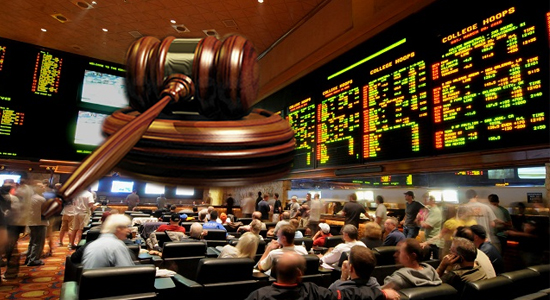It’s Like Gambling: NCAA Rules Against Fantasy Football
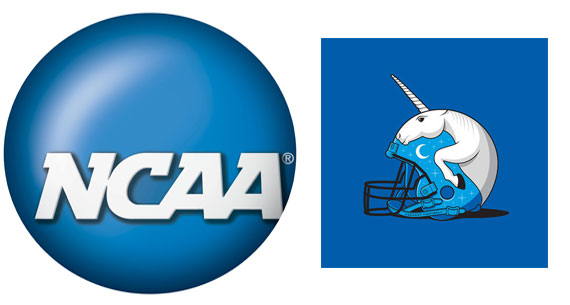
NCAA rules against fantasy football threatens participating athletes with a year of suspension.According to Oliver Luck, the executive of the college sports organization and father of Indianapolis Colts quarterback Andrew Luck, entry-fee daily fantasy sports qualify as sports gambling, which is prohibited for NCAA players. This means that athletes playing fantasy games for money violate the organization’s gambling laws. They will automatically lose one year of their eligibility if caught playing DraftKings or FanDuel.
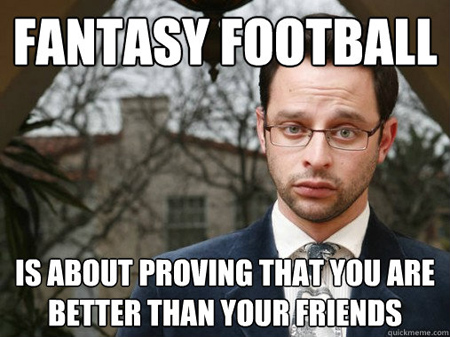
Like the NFL and unlike the NBA and the MLB, NCAA strongly opposes sports gambling. But the amateur sports organization went one step further recently. They declared that entry-fee daily fantasy sports are also a form of sports gambling.
Though the major leagues all embraced these games – or just did not act to prevent them growing – NCAA has a firm stance against the matter. They argue that it is a threat towards the integrity of the game and amateur players are far more vulnerable like their pro colleagues.
Since there is big money in this business, it is obvious that at some point it will worth it for someone to try to influence the result of college sports scores to make some cash. The majority of the NCAA athletes have no shot at professional careers at all. So, why not try to earn some extra income towards the end of their college careers?
Huffingtonpost.com: Why The NCAA Is So Uneasy About The Rise Of Daily Fantasy Sports
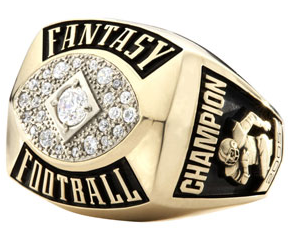
This champion ring is just as…real as fantasy football
A survey from 2004 found that 1.4% of college athletes changed their performance in order to influence the result of a game. According to a 2012 survey, 4.6% of college players were approached by outsiders for confidential information. The latest big point-shaving scandal in NCAA basketball from 2004 to 2006 also emphasizes the threats towards the integrity of college sports.
Taking all this into account, it is no wonder that NCAA rules against fantasy football are the same as against traditional forms of sports gambling. However, many experts of gambling facts consider this as an outdated and hypocritical approach. Labeling all this as gambling and prohibiting it, won’t solve the problem.
A few players might get caught and would be handed a year suspension, but this thing is so widespread, that it won’t avert athletes from playing. The 2012 survey that was mentioned above, found that 50% percent of NCAA athletes played fantasy sports. It was three years ago, and these games grew massively since then…
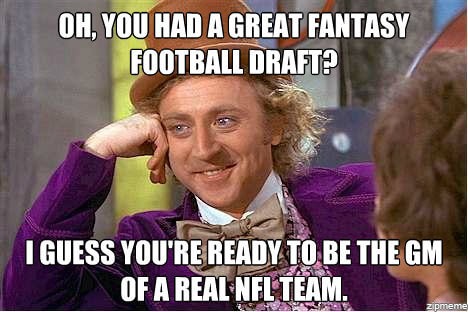
The NCAA want to ban college games from the catalogues of daily fantasy sports sites. Though this would be a better solution, it is hard to see happening anytime soon. And even if they would be able to get a gambling regulation like this implemented, all this would continue in illegality…


NCAA rules against fantasy football threatens participating athletes with a year of suspension.According to Oliver Luck, the executive of the college sports organization and father of Indianapolis Colts quarterback Andrew Luck, entry-fee daily fantasy sports qualify as sports gambling, which is prohibited for NCAA players. This means that athletes playing fantasy games for money violate the organization’s gambling laws. They will automatically lose one year of their eligibility if caught playing DraftKings or FanDuel.

Like the NFL and unlike the NBA and the MLB, NCAA strongly opposes sports gambling. But the amateur sports organization went one step further recently. They declared that entry-fee daily fantasy sports are also a form of sports gambling.
Though the major leagues all embraced these games – or just did not act to prevent them growing – NCAA has a firm stance against the matter. They argue that it is a threat towards the integrity of the game and amateur players are far more vulnerable like their pro colleagues.
Since there is big money in this business, it is obvious that at some point it will worth it for someone to try to influence the result of college sports scores to make some cash. The majority of the NCAA athletes have no shot at professional careers at all. So, why not try to earn some extra income towards the end of their college careers?
Huffingtonpost.com: Why The NCAA Is So Uneasy About The Rise Of Daily Fantasy Sports

This champion ring is just as…real as fantasy football
A survey from 2004 found that 1.4% of college athletes changed their performance in order to influence the result of a game. According to a 2012 survey, 4.6% of college players were approached by outsiders for confidential information. The latest big point-shaving scandal in NCAA basketball from 2004 to 2006 also emphasizes the threats towards the integrity of college sports.
Taking all this into account, it is no wonder that NCAA rules against fantasy football are the same as against traditional forms of sports gambling. However, many experts of gambling facts consider this as an outdated and hypocritical approach. Labeling all this as gambling and prohibiting it, won’t solve the problem.
A few players might get caught and would be handed a year suspension, but this thing is so widespread, that it won’t avert athletes from playing. The 2012 survey that was mentioned above, found that 50% percent of NCAA athletes played fantasy sports. It was three years ago, and these games grew massively since then…

The NCAA want to ban college games from the catalogues of daily fantasy sports sites. Though this would be a better solution, it is hard to see happening anytime soon. And even if they would be able to get a gambling regulation like this implemented, all this would continue in illegality…

Court Ruling to Decide the Fate of Sports Betting in New Jersey
Officials had plans to open a sports betting service at the New Jersey race tracks as soon as possible, but it looks like they need more time.
At the beginning of September, Governor Chris Christie’s administration took one more step to help New Jersey’s gambling industry grow, by issuing a directive that made it legal for casinos and racetracks to offer sports betting services.
But it looks like there are more hurdles to pass before New Jersey players can legally place wager on sports scores, as the decision was challenged by professional sports leagues. These are the same organizations which fought the state’s efforts to reverse the ban on sports betting, when the US Supreme Court declined to hear the case.
The governor said he did his research and found no trace of previous federal court rulings prohibiting casinos and horse racing tracks from offering sports betting. Now the topic has become a widely debated issue, with a federal ruling expected on October 6.
Miami Herald: New Jersey track extends date for sports betting
The management of the racetrack had plans to open the sportsbook in 45 days, or at least by the end of October. Dennis Drazin, a legal adviser to Monmouth Park, was even more optimistic, hoping to get things going on the first weekend after the directive was issued.
Now the racetrack announced it was taking its time with the big launch, giving the federal judge time to rule on the legality of the directive issued by the New Jersey administration. The court decision is expected to be issued on October 6.
Recent online gambling news wrote that Monmouth Park needs more time to set up phone lines and Internet connections for the operation, as well as to hire 111 new employees. The racetrack is planning on establishing its own private association to regulate sports betting, since the state hasn’t taken care of this. Other casinos or racetracks will be welcome to join the group.
While the legal adviser said he would start taking bets as soon as possible, a Meadowlands Racetrack spokeswoman for the said the establishment wasn’t planning on offering such services for now.
Houston Chronicle: Q&A: New Jersey’s sports gambling push
After Government Chris Christie issued an order this September, saying that racetracks and casinos won’t be prosecuted for taking wagers on sports event, legal issues are still waiting to be resolved before establishments actually start accepting bets. The Houston Chronicle offers answers to some of the most common questions surrounding the issue.
If you want to know why no one is offering sports betting yet, you should know that racetracks and casinos are still waiting for a federal judge to rule on the legality of the new directive. The New Jersey Legislature might also need to take further action before operators launch these services.
The professional sports leagues who sued Christie in 2012 to stop sports wagering in the state have not taken any legal action against the September 8 order yet, but they are probably also waiting for the judge to rule on the issue before proceeding.
Monmouth Park Racetrack officials have already indicated they’d be willing to take bets as soon as possible. The racetrack is even working with a sports betting firm, preparing a room to be used for the new service.
NJ.com: Quigley: Sports betting banned? Don’t bet on it
Good news for New Jersey players eager to put money on sports event. Governor Christie made sportsbooks legal in the state, and Monmouth Park promised to offer these services real soon. Some limitations might be imposed, such as betting on games played in state or being played by New Jersey colleges, but apart from that, sports wagering might get the green light through racetracks and casinos.
In 1992, when Congress passed the Professional and Amateur Sports Protection Act, sports betting became illegal in all but four states. Nevada, Delaware, Oregon and Montana already permitted such wagering, so they were exempt from the rules. A recent poll showed New Jersey residents were two-to-one in favor, but until recently the activity has been illegal.
After four Atlantic City casinos closed this summer, reread an old court decision and concluded that as long as New Jersey did not officially “authorize” sports betting, the state would not get into any legal trouble. This is how the Governor decided he would issue an order saying that entities running sports betting activities would not be prosecuted.
The state treasury is bound to gain from ordinary corporate business taxes, while racetracks and casinos will benefit from an increased client base.

Officials had plans to open a sports betting service at the New Jersey race tracks as soon as possible, but it looks like they need more time.
At the beginning of September, Governor Chris Christie’s administration took one more step to help New Jersey’s gambling industry grow, by issuing a directive that made it legal for casinos and racetracks to offer sports betting services.
But it looks like there are more hurdles to pass before New Jersey players can legally place wager on sports scores, as the decision was challenged by professional sports leagues. These are the same organizations which fought the state’s efforts to reverse the ban on sports betting, when the US Supreme Court declined to hear the case.
The governor said he did his research and found no trace of previous federal court rulings prohibiting casinos and horse racing tracks from offering sports betting. Now the topic has become a widely debated issue, with a federal ruling expected on October 6.
Miami Herald: New Jersey track extends date for sports betting
The management of the racetrack had plans to open the sportsbook in 45 days, or at least by the end of October. Dennis Drazin, a legal adviser to Monmouth Park, was even more optimistic, hoping to get things going on the first weekend after the directive was issued.
Now the racetrack announced it was taking its time with the big launch, giving the federal judge time to rule on the legality of the directive issued by the New Jersey administration. The court decision is expected to be issued on October 6.
Recent online gambling news wrote that Monmouth Park needs more time to set up phone lines and Internet connections for the operation, as well as to hire 111 new employees. The racetrack is planning on establishing its own private association to regulate sports betting, since the state hasn’t taken care of this. Other casinos or racetracks will be welcome to join the group.
While the legal adviser said he would start taking bets as soon as possible, a Meadowlands Racetrack spokeswoman for the said the establishment wasn’t planning on offering such services for now.
Houston Chronicle: Q&A: New Jersey’s sports gambling push
After Government Chris Christie issued an order this September, saying that racetracks and casinos won’t be prosecuted for taking wagers on sports event, legal issues are still waiting to be resolved before establishments actually start accepting bets. The Houston Chronicle offers answers to some of the most common questions surrounding the issue.
If you want to know why no one is offering sports betting yet, you should know that racetracks and casinos are still waiting for a federal judge to rule on the legality of the new directive. The New Jersey Legislature might also need to take further action before operators launch these services.
The professional sports leagues who sued Christie in 2012 to stop sports wagering in the state have not taken any legal action against the September 8 order yet, but they are probably also waiting for the judge to rule on the issue before proceeding.
Monmouth Park Racetrack officials have already indicated they’d be willing to take bets as soon as possible. The racetrack is even working with a sports betting firm, preparing a room to be used for the new service.
NJ.com: Quigley: Sports betting banned? Don’t bet on it
Good news for New Jersey players eager to put money on sports event. Governor Christie made sportsbooks legal in the state, and Monmouth Park promised to offer these services real soon. Some limitations might be imposed, such as betting on games played in state or being played by New Jersey colleges, but apart from that, sports wagering might get the green light through racetracks and casinos.
In 1992, when Congress passed the Professional and Amateur Sports Protection Act, sports betting became illegal in all but four states. Nevada, Delaware, Oregon and Montana already permitted such wagering, so they were exempt from the rules. A recent poll showed New Jersey residents were two-to-one in favor, but until recently the activity has been illegal.
After four Atlantic City casinos closed this summer, reread an old court decision and concluded that as long as New Jersey did not officially “authorize” sports betting, the state would not get into any legal trouble. This is how the Governor decided he would issue an order saying that entities running sports betting activities would not be prosecuted.
The state treasury is bound to gain from ordinary corporate business taxes, while racetracks and casinos will benefit from an increased client base.

Bet on USA to win and advance in World Cup
Team USA is only one win away from advancing to the round of 16 in the 2010 FIFA World Cup, facing Algeria
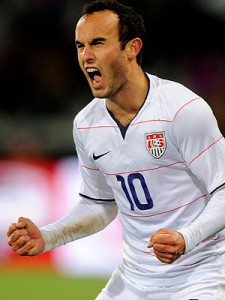 Both Ladbrokes and Brobury Sports are giving the Americans’ good chances to win this one, the odds are +111 (11/10). All the eyes in this game will be on the USA team as they face off Algeria.
Both Ladbrokes and Brobury Sports are giving the Americans’ good chances to win this one, the odds are +111 (11/10). All the eyes in this game will be on the USA team as they face off Algeria.
A low score is expected, with USA winning 1-0 getting the shortest odds in Ladbrokes Correct Score betting at 5/1. Want to bet on who will score the winning goal? Landon Donovan, Jozy Altidore and Clint Dempsey are getting 5/1 odds … will it be a header this time around?
At Brobury Sports, bet on the World Cup and receive a 50% signup bonus on all deposits of at least $100 for up to $500. Or get $25 in free bets from Ladbrokes by making just $5 in World Cup bets – with either deal, you can’t go wrong with these quality sportsbooks.
Team USA is only one win away from advancing to the round of 16 in the 2010 FIFA World Cup, facing Algeria
 Both Ladbrokes and Brobury Sports are giving the Americans’ good chances to win this one, the odds are +111 (11/10). All the eyes in this game will be on the USA team as they face off Algeria.
Both Ladbrokes and Brobury Sports are giving the Americans’ good chances to win this one, the odds are +111 (11/10). All the eyes in this game will be on the USA team as they face off Algeria.
A low score is expected, with USA winning 1-0 getting the shortest odds in Ladbrokes Correct Score betting at 5/1. Want to bet on who will score the winning goal? Landon Donovan, Jozy Altidore and Clint Dempsey are getting 5/1 odds … will it be a header this time around?
At Brobury Sports, bet on the World Cup and receive a 50% signup bonus on all deposits of at least $100 for up to $500. Or get $25 in free bets from Ladbrokes by making just $5 in World Cup bets – with either deal, you can’t go wrong with these quality sportsbooks.
Kobe Rallies Lakers Past Jazz In 2nd-Round Opener
Check out the latest NBA betting odds
Check out the latest NBA betting odds
Bet on Sports Online Former Executive Headed to Jail

David Carruthers, the former head of the online sportsbook Bet on Sports Online, has just been sentenced to 33 months in jail.
He was arrested three years ago by FBI agents for running a company that let US players wager on sports over the internet. Carruthers was charged with racketeering and conspiracy.
Telegraph: Bet on Sports Online executive jailed
David Carruthers, the former head of an online sportsbook company called Bet on Sports Online, has plead guilty to charges of racketeering and conspiracy, and has been sentenced to 33 months in jail.
The charges are connected to the company’s operations in the US, where online gambling is restricted. The fiasco follows the government’s crackdown on offshore online gambling sites that illegally accept wagers from American players. Bet on Sports Online saw profits of $3.5bn (£2.2bn) between 2002 and 2004, and most of that revenue came from players in the US.
Carruthers has been living under house arrest in a hotel in Missouri for the last three years, ever since he was detained by the FBI at Dallas Airport while on his way to Costa Rica, where Bet on Sports Online is headquartered.
Assistant US Attorney Steven Holtshouser said: “Previously, executives, owners and investors believed that they were immune from the reach of US law enforcement. Both the conviction of, and sentence handed down against Mr Carruthers should send a message to any foreign business conducting illegal activities in the United States, that geography does not render it untouchable.”
Last year, founder of Bet on Sports Online, Gary Kaplan was sentenced to more than four years in prison after agreeing to forfeit more than £43m.
Bet on Sports Online Boss Jailed
A SCOTS gambling executive has been sentenced to almost three years in the US after pleading guilty to charges of racketeering. David Carruthers has spent the last three years under house arrest at a hotel in Missouri for violating American gambling laws.
Edinburgh-born Carruthers was chief executive of the massive internet sporstsbook BetOnSports. Carruthers appeared in court on Friday, where he was sentenced to 33 months after striking a deal with prosecutors.
Carruthers read a prepared statement at the hearing, apologizing for breaking US gambling regulations in a prepared statement to the hearing. He said: “I understand now that the business was operating outside the laws of the United States. I realize I made the biggest mistake of my life. I am sorry for the actions of BetOnSports and the trouble it caused.”
He was arrested by the FBI agents in July 2006 as he passed through Dallas Airport on his way to the company headquarters in Costa Rica. His wife Carol was with him at the time, and was also detained.
Carruthers is accused of breaking US law by presiding over a company that accepted illegal sports bets on the internet from American bettors.
Gambling Executive Sentenced to Prison
David Carruthers, the former chief executive of the online sports betting company Bet on Sports Online, has just been sentenced to 33 months in prison.
On Friday, Carruthers pleaded guilty racketeering conspiracy. Carruthers and 10 other individuals, including the company’s founder Gary S. Kaplan were indicted in 2006. Each was accused of violating an old federal law that forbids the placement of wagers by wire.
“I understand now that the business was operating outside the laws of the United States,” said Carruthers in a statement he read to the judge Carol during his trial.
Bet on Sports Online saw $1.25 billion in profits in 2004, with 98% of that revenue coming from bets made across the internet by players in United States.


David Carruthers, the former head of the online sportsbook Bet on Sports Online, has just been sentenced to 33 months in jail.
He was arrested three years ago by FBI agents for running a company that let US players wager on sports over the internet. Carruthers was charged with racketeering and conspiracy.
Telegraph: Bet on Sports Online executive jailed
David Carruthers, the former head of an online sportsbook company called Bet on Sports Online, has plead guilty to charges of racketeering and conspiracy, and has been sentenced to 33 months in jail.
The charges are connected to the company’s operations in the US, where online gambling is restricted. The fiasco follows the government’s crackdown on offshore online gambling sites that illegally accept wagers from American players. Bet on Sports Online saw profits of $3.5bn (£2.2bn) between 2002 and 2004, and most of that revenue came from players in the US.
Carruthers has been living under house arrest in a hotel in Missouri for the last three years, ever since he was detained by the FBI at Dallas Airport while on his way to Costa Rica, where Bet on Sports Online is headquartered.
Assistant US Attorney Steven Holtshouser said: “Previously, executives, owners and investors believed that they were immune from the reach of US law enforcement. Both the conviction of, and sentence handed down against Mr Carruthers should send a message to any foreign business conducting illegal activities in the United States, that geography does not render it untouchable.”
Last year, founder of Bet on Sports Online, Gary Kaplan was sentenced to more than four years in prison after agreeing to forfeit more than £43m.
Bet on Sports Online Boss Jailed
A SCOTS gambling executive has been sentenced to almost three years in the US after pleading guilty to charges of racketeering. David Carruthers has spent the last three years under house arrest at a hotel in Missouri for violating American gambling laws.
Edinburgh-born Carruthers was chief executive of the massive internet sporstsbook BetOnSports. Carruthers appeared in court on Friday, where he was sentenced to 33 months after striking a deal with prosecutors.
Carruthers read a prepared statement at the hearing, apologizing for breaking US gambling regulations in a prepared statement to the hearing. He said: “I understand now that the business was operating outside the laws of the United States. I realize I made the biggest mistake of my life. I am sorry for the actions of BetOnSports and the trouble it caused.”
He was arrested by the FBI agents in July 2006 as he passed through Dallas Airport on his way to the company headquarters in Costa Rica. His wife Carol was with him at the time, and was also detained.
Carruthers is accused of breaking US law by presiding over a company that accepted illegal sports bets on the internet from American bettors.
Gambling Executive Sentenced to Prison
David Carruthers, the former chief executive of the online sports betting company Bet on Sports Online, has just been sentenced to 33 months in prison.
On Friday, Carruthers pleaded guilty racketeering conspiracy. Carruthers and 10 other individuals, including the company’s founder Gary S. Kaplan were indicted in 2006. Each was accused of violating an old federal law that forbids the placement of wagers by wire.
“I understand now that the business was operating outside the laws of the United States,” said Carruthers in a statement he read to the judge Carol during his trial.
Bet on Sports Online saw $1.25 billion in profits in 2004, with 98% of that revenue coming from bets made across the internet by players in United States.






